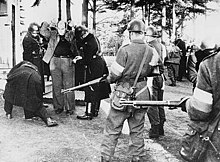
Back Baltenauslieferung German Balti sõdurite väljaandmine Rootsis Estonian הסגרת הבלטים HE Estradizione svedese dei soldati baltici Italian Pabaltijiečių kareivių ekstradicija iš Švedijos Lithuanian Baltiešu izdošana Latvian/Lettish Выдача прибалтийских легионеров Russian Baltutlämningen Swedish
This article includes a list of general references, but it lacks sufficient corresponding inline citations. (April 2022) |

The Swedish extradition of Baltic soldiers, or simply the Extradition of the Balts (Swedish: Baltutlämningen), was a controversial political event that took place in January 1946, in the aftermath of World War II when Sweden, a neutral country during the war, extradited to the Soviet Union some 150 Latvian and Estonian soldiers who had been recruited[broken anchor] into Waffen-SS by Germany as well as 9 Lithuanian soldiers who had been fighting against the Soviet invasion of the Baltic states during the war. Many of them were subsequently imprisoned, and five were sentenced to death by the Soviet government, with three executions carried out and two sentences commuted to hard labour.